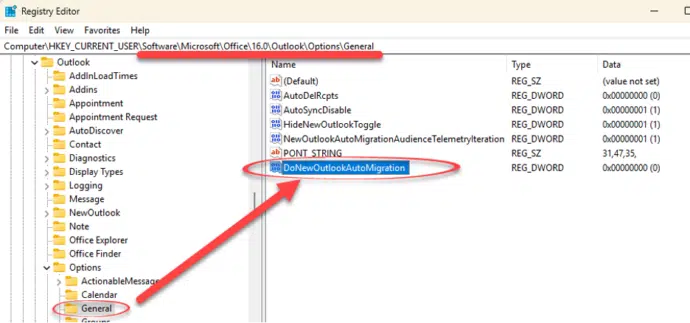How to prevent Microsoft from pushing a change from classic Outlook for Windows to their new and incomplete Outlook (new).
Microsoft is pushing customers to use Outlook (new) even though the software doesn’t have basic features like proper offline support or interactions between mailboxes. New Outlook also has a serious privacy breach for anyone using Gmail, Yahoo or any other non-Microsoft mailbox.
We strongly suggest all classic Outlook customers to stick with ‘the devil they know’, for the moment. Outlook (classic) remains supported for the next five years, until 2029.
Try Outlook (new) when you want to, not by some schedule that suits Microsoft’s corporate agenda.
Outlook Option
Microsoft says there’s a choice to opt out of automatic migration: File | Options | General | New Outlook options | Automatically switch me to new Outlook.
Regrettably, this feature has not been available in any public or beta releases of Outlook for Windows, even for users with a Business Standard or Premium license.
It’s one sign of Microsoft haphazard release of Outlook (new) that they can document a feature without bothering to see if it’s available to customers.
Registry entry
Until the Outlook option appears, there’s a registry workaround. Microsoft’s instructions aren’t very clear because they give two different registry entries for blocking forced migration to Outlook (new). Maybe they both do the same thing?
HKEY_CURRENT_USER\Software\Microsoft\Office\16.0\Outlook\Options\GeneralDoNewOutlookAutoMigrationDWORD: 0 – stops Automatic Migration
DWORD: 1 – allows auto migration

Add the “General” key if necessary from Edit | New | Key under the existing “Options” key.
Elsewhere, Microsoft suggests this key
HKEY_CURRENT_USER\Software\Policies\Microsoft\office\16.0\outlook\preferencesNewOutlookMigrationUserSettingDWORD: 0 – stop automatic migration.
DWORD: 1 – automatic migration allowed
(not set): the default is to allow automatic migration, it’s up to each user.

We might know more when the setting appears in the Outlook software because then we can see what registry change is made.
Group Policies
For IT admins, there are Group and Cloud Policies available to control migration to new Outlook.
WIndows 10
In early 2025, Outlook (new) is pushed to Windows 10 users via a security update.
See New Outlook coming to Windows 10, like it or not . There’s no way to stop that happening but Outlook (new) can be removed by IT admins after the update is applied.
New Outlook now available to all